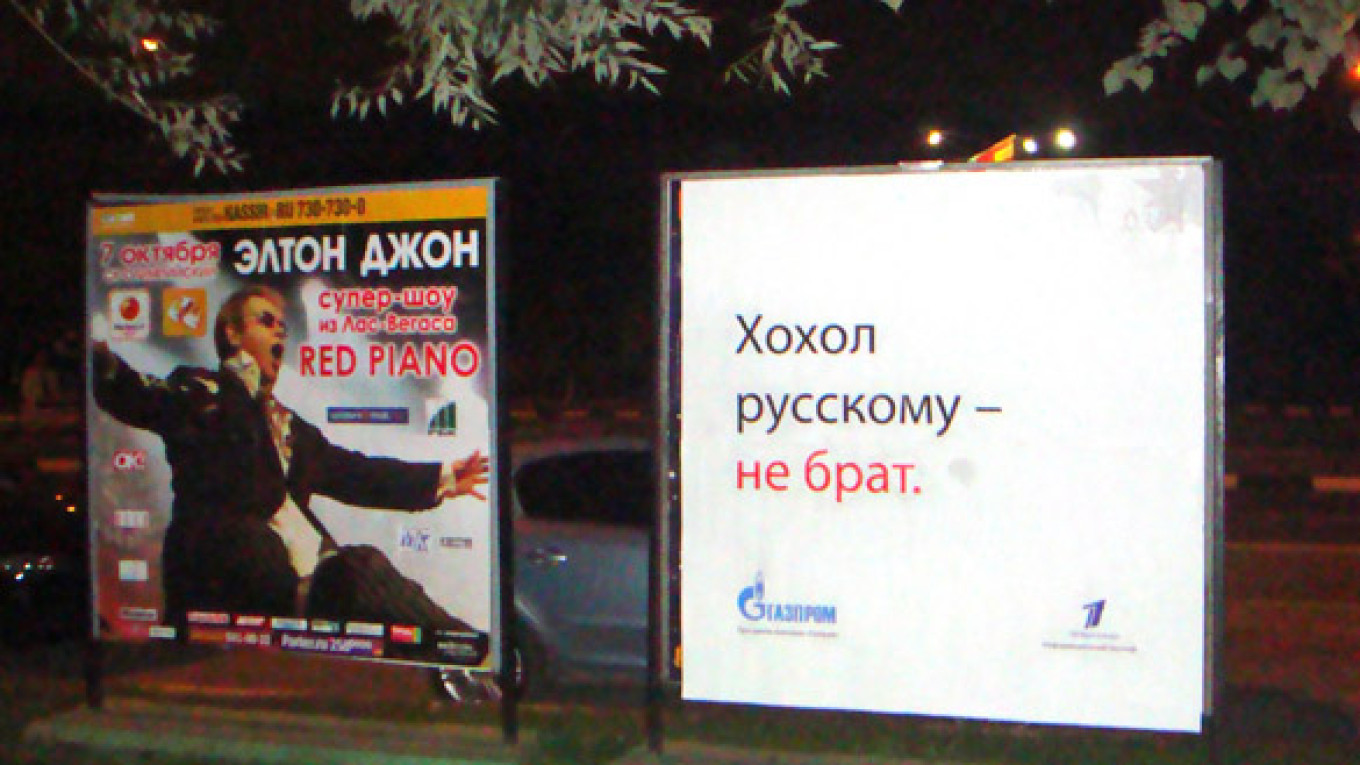A group of anonymous Muscovites have given new meaning to the term black PR, using the cover of darkness to post a series of advertisements purporting to represent the views of City Hall, Nashi and the traffic police.
One billboard contained an offensive nickname that Russian nationalists use to refer to Ukrainians, saying, “A khokhol is no brother to a Russian” and depicting the emblems of Gazprom and Channel One state television. Another read, “A tender has to be fair,” and had logos for City Hall’s tenders committee and Inteko, the construction firm headed by Mayor Yury Luzhkov’s wife, Yelena Baturina.
The six banners, posted illegally late last month on busy Moscow streets, were torn down before the morning’s rush-hour traffic had time to notice. But photos of the billboards have been making their way around the Internet, and the slogans’ creator told The Moscow Times on Tuesday that more were on the way.
The campaign comes in the run-up to this weekend’s City Duma elections, widely expected to hand a landslide victory to the ruling United Russia party.
And while isolated acts of vandalism might not give the ruling elite reason for worry, they appeared to tap a wider dissatisfaction with the status quo.
The independent Levada Center released a poll Tuesday showing that the number of people giving Mayor Yury Luzhkov a high rating has almost halved since the spring, falling to just 36 percent from 65 percent in April.
Only 3 percent of respondents said they believed the Moscow city vote would be “absolutely fair.”
The creator of the black PR ad campaign said by mobile phone that he acted “to attract public attention [to the] things that irritate him.”
“I could have posted the slogans on the Internet at once, but I figured that pictures of billboards on Moscow streets would draw a larger public response,” said Alexei, who refused to give his last name because he had hung the billboards illegally. He said he was aged between 25 and 30, did not represent any political or other group, and worked for an insurance company.
Alexei said he and two friends hung the posters at night about 10 days ago on six streets, including Leninsky Prospekt, Kutuzovsky Prospekt and Mosfilmovskaya Ulitsa.
He was reluctant to elaborate on the meaning of the messages on the billboards, saying only that those about Ukrainians and Georgians were directed against “people who incite ethnic conflicts to satisfy their personal selfish interests.”
One billboard says, “A Georgian is no comrade of a Russian,” and claims to be sponsored by the pro-Kremlin Nashi youth group and Channel One.
Yet another billboard says, “Smoke, drink, give birth to freaks,” and had logos for Moscow City Hall and Jaguar, an alcoholic energy drink.
“I believe that clever people will understand,” Alexei said.
He said it cost about 3,000 rubles ($100) to print the posters, which were designed by a friend free of charge.
Alexei said he plans to hang more posters with new slogans in about a week.
A spokeswoman for the City Hall’s advertising committee said no one was available for comment Tuesday.
In early April, several outdoor media agencies backed out of agreements with the Business FM radio station to place satirical ads poking fun at the government and its handling of the financial crisis. The ads posed questions such as, “What percentage of government officials take bribes?” and used the station’s frequency, 87.5, as the answer.
A Message from The Moscow Times:
Dear readers,
We are facing unprecedented challenges. Russia's Prosecutor General's Office has designated The Moscow Times as an "undesirable" organization, criminalizing our work and putting our staff at risk of prosecution. This follows our earlier unjust labeling as a "foreign agent."
These actions are direct attempts to silence independent journalism in Russia. The authorities claim our work "discredits the decisions of the Russian leadership." We see things differently: we strive to provide accurate, unbiased reporting on Russia.
We, the journalists of The Moscow Times, refuse to be silenced. But to continue our work, we need your help.
Your support, no matter how small, makes a world of difference. If you can, please support us monthly starting from just $2. It's quick to set up, and every contribution makes a significant impact.
By supporting The Moscow Times, you're defending open, independent journalism in the face of repression. Thank you for standing with us.
Remind me later.


